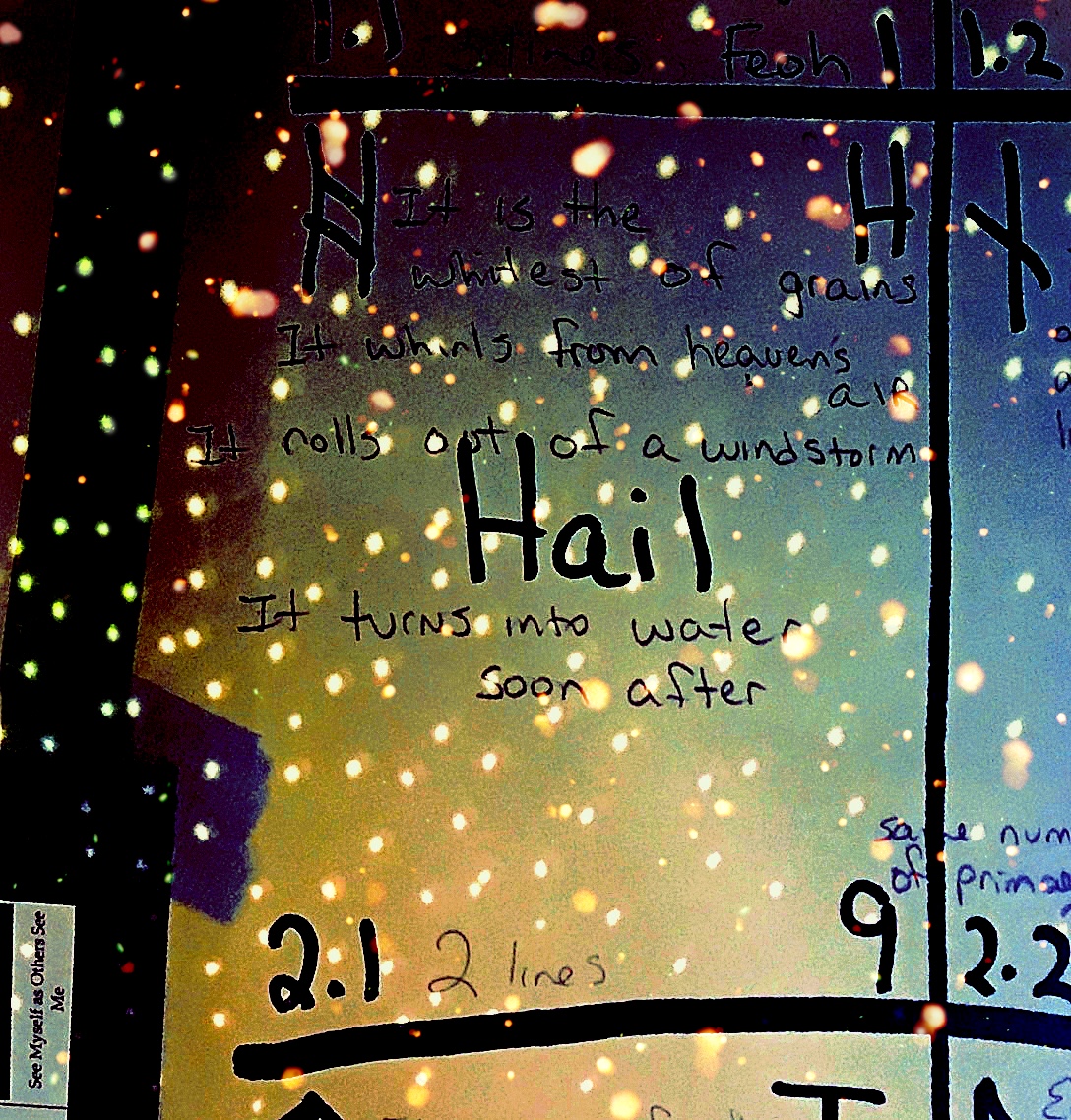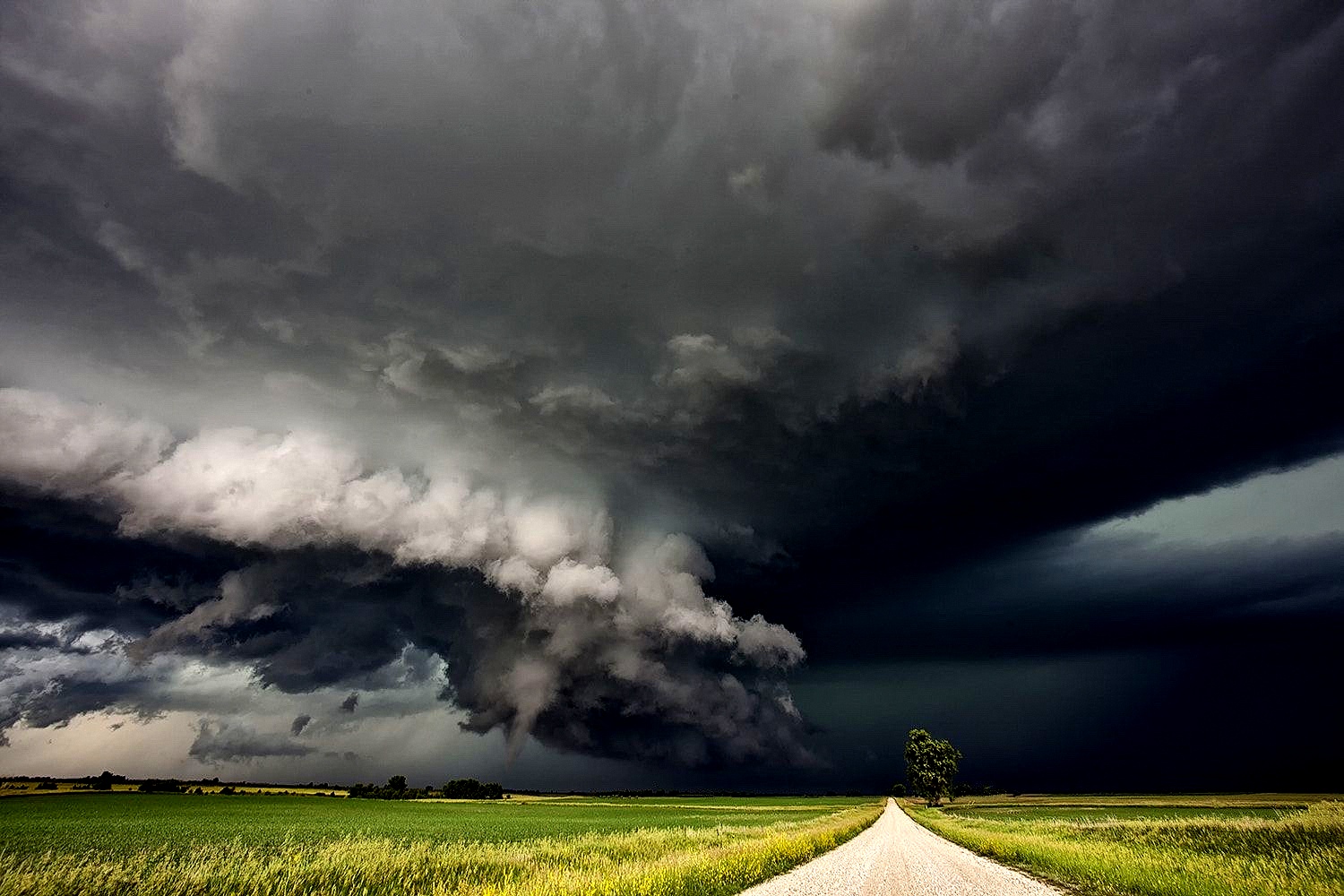
ᚻ byþ hwitust corna. hwyrft hit of heofones lyfte.
wealcaþ hit windes scuras. weorþeþ hit to wætere syððan ᛬᛫
It is the whitest of grains; it whirls from heaven’s air,
It rolls out of a wind storm, it turns into water soon after.
 The Rune Poem’s stanzas vary in length. Each of the first eight stanzas consist of three lines containing four beats of stressed syllables: twelve beats total. Then we get an abrupt shift toward brevity with a pair side by side, Hail and Need, which have two lines each. They are shorter, but their words beat out the same number of stresses as the previous three line stanzas: still twelve beats total. Sing it. To get all twelve beats into two thirds the space, your song has to speed up. The stressed words come fast, as does hail and need when they storm down suddenly on your head and destroy your abundance.
The Rune Poem’s stanzas vary in length. Each of the first eight stanzas consist of three lines containing four beats of stressed syllables: twelve beats total. Then we get an abrupt shift toward brevity with a pair side by side, Hail and Need, which have two lines each. They are shorter, but their words beat out the same number of stresses as the previous three line stanzas: still twelve beats total. Sing it. To get all twelve beats into two thirds the space, your song has to speed up. The stressed words come fast, as does hail and need when they storm down suddenly on your head and destroy your abundance.
There’s more math going on here too. The Rune Poem is traditionally divided into three groups of eight stanzas with five extra vowels tacked onto the end as necessary accommodations for sound changes over time. Hail starts the second group … More
 The people of the Rune Poem were farmers and seafarers living in a wet country, and they had a much closer relationship with weather than we have. We can spend whole productive lives indoors, deep indoors, climate controlled, insulated, where rain cannot penetrate, and we might wonder sometimes is it windy outside? The Rune Poem singers did not need to go outside to find out: they felt the wind in their homes and their bones. Their houses were much more porous, and if the wind wants to send hail smashing down upon their roofs, crops, heads, they would feel it bitterly. If the storm lashes the sea all around their boats, they’ll be stuck in it terrified, buffeted by waves, riding it out. And they would ride it out. Sometimes the wind brings tempests, but all storms become calm water.
The people of the Rune Poem were farmers and seafarers living in a wet country, and they had a much closer relationship with weather than we have. We can spend whole productive lives indoors, deep indoors, climate controlled, insulated, where rain cannot penetrate, and we might wonder sometimes is it windy outside? The Rune Poem singers did not need to go outside to find out: they felt the wind in their homes and their bones. Their houses were much more porous, and if the wind wants to send hail smashing down upon their roofs, crops, heads, they would feel it bitterly. If the storm lashes the sea all around their boats, they’ll be stuck in it terrified, buffeted by waves, riding it out. And they would ride it out. Sometimes the wind brings tempests, but all storms become calm water.

 The light outside has turned green, hail is falling everywhere, and the tornado is upon you. Literally. Oferheah over head. Surviving a tornado can be a simple thing if you plan ahead and don’t panic. Otherwise you have internalized the whirlwind, and spinning out is seldom useful.
The light outside has turned green, hail is falling everywhere, and the tornado is upon you. Literally. Oferheah over head. Surviving a tornado can be a simple thing if you plan ahead and don’t panic. Otherwise you have internalized the whirlwind, and spinning out is seldom useful.
Choose your tornado wisely. Shh. Listen. A quieter tornado contains fewer objects and will be safer than the one roaring from the sound of stuff smashing together. Also notice color. A white or gray tornado does not hold as much debris as one that has turned brown. Try to pick a nice clean one.
Also try to avoid being blown off your feet. Stay out of cars and trailers. If you have a windowless bathroom with a bathtub in it, get in the tub. Do not turn on the water and take a bath, you do not want to be hurled out of it … More
 It’s a beautiful surprise spiraling your direction, a most remarkable, even unusual thing, here to pummel your life and batter it down. Watch out because it happens fast and ruins everything. It’s ok. Everything is temporary and this will melt away peacefully.
It’s a beautiful surprise spiraling your direction, a most remarkable, even unusual thing, here to pummel your life and batter it down. Watch out because it happens fast and ruins everything. It’s ok. Everything is temporary and this will melt away peacefully.

 Voiceless spirant. Make a narrow aperture of your mouth and throat, leave your vocal cords aside, and force air through. Create friction, steam up the mirror. Huh. Hah.
Voiceless spirant. Make a narrow aperture of your mouth and throat, leave your vocal cords aside, and force air through. Create friction, steam up the mirror. Huh. Hah.
Placed at the beginning of a word this letter sounds like a modern English H: a very light exhalation of the breath. In the middle or at the end it toughens up, sounds stronger, the spirancy has some voice to it, it’s a clearing of the throat not to be found written with an H in modern English, but just ask Bach who would have given this sort of H some voice, especially when sitting by the loch at nicht. In Old English give them all a sound, every H, heed me well there is no silent H here, I am happy to say. But in modern English? H is being dropped all over the place. H is an heir to naught, almost a ghost.
Stand up … More
